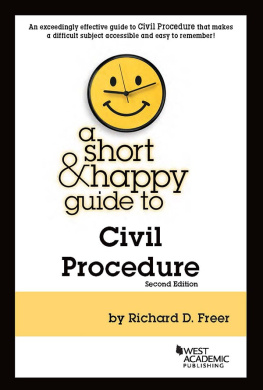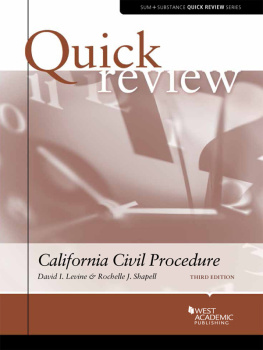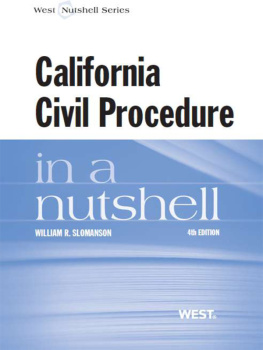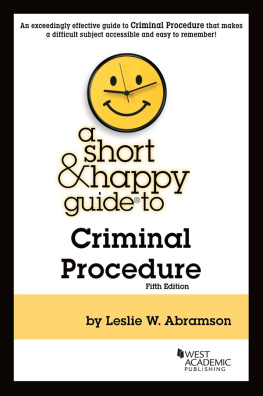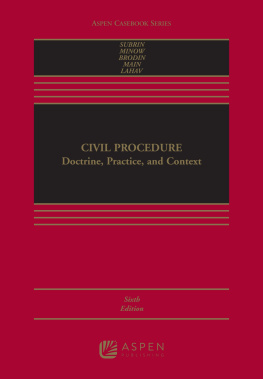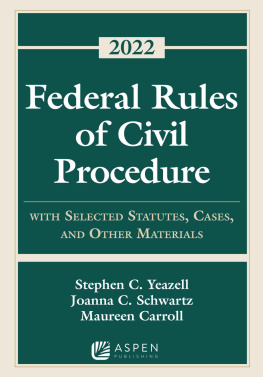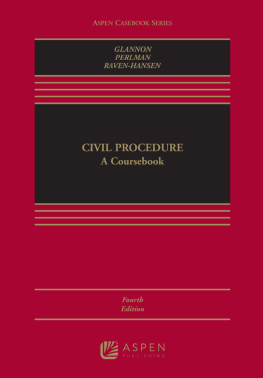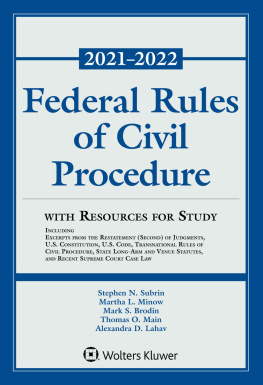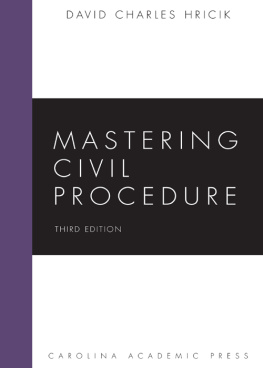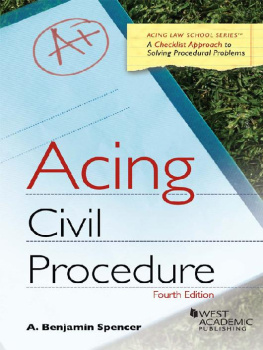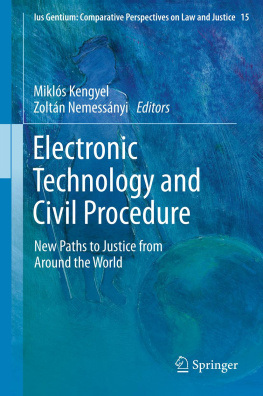West Academic Publishings Law School Advisory Board
Jesse H. Choper
Professor of Law and Dean Emeritus
University of California, Berkeley
Joshua Dressler
Distinguished University Professor Emeritus,
Frank R. Strong Chair in Law
Michael E. Moritz College of Law, The Ohio State University
Yale Kamisar
Professor of Law Emeritus, University of San Diego
Professor of Law Emeritus, University of Michigan
Mary Kay Kane
Professor of Law, Chancellor and Dean Emeritus
University of California, Hastings College of the Law
Larry D. Kramer
President, William and Flora Hewlett Foundation
Jonathan R. Macey
Professor of Law, Yale Law School
Arthur R. Miller
University Professor, New York University
Formerly Bruce Bromley Professor of Law, Harvard University
Grant S. Nelson
Professor of Law Emeritus, Pepperdine University
Professor of Law Emeritus, University of California, Los Angeles
A. Benjamin Spencer
Justice Thurgood Marshall Distinguished Professor of Law
University of Virginia School of Law
James J. White
Robert A. Sullivan Professor of Law Emeritus
University of Michigan

Civil Procedure
Second Edition
Richard D. Freer
Charles Howard Candler Professor of Law
Emory University
A SHORT & HAPPY GUIDE SERIES

The publisher is not engaged in rendering legal or other professional advice, and this publication is not a substitute for the advice of an attorney. If you require legal or other expert advice, you should seek the services of a competent attorney or other professional.
a short & happy guide series is a trademark registered in the U.S. Patent and Trademark Office.
2014 LEG, Inc. d/b/a West Academic
2019 LEG, Inc. d/b/a West Academic
444 Cedar Street, Suite 700
St. Paul, MN 55101
1-877-888-1330
Printed in the United States of America
ISBN: 978-1-68467-228-8
To Weasie, Collin, Courtney, Bee, Cookie, Cheeto, and Manny
Table of Contents
Bristol-Myers Squibb and a New Emphasis on
Relatedness
Venue, Transfer, and Forum Non
Conveniens
Same Claimant Versus Same Defendant in Both
Cases
Mutuality: By Whom Issue Preclusion May Be
Asserted
A Short & Happy Guide to
Civil Procedure
Second Edition

Introduction
Why and How Law School Is Different from College
Welcome to law school and welcome to Civil Procedure! Law school is exciting and intellectually stimulating. As you start your legal career, it is helpful to understand why and how law school is different from college. Your goal hereyour job as a law studentis different from what it was in college.
Why is law school different from college? In law school, you are being educated and trained to practice a profession . For most of us, that was not true in college. Most of us were liberal arts majors. The goal of a liberal arts education was to learn things for their intrinsic value, and not to apply them to any particular purpose. Very few people make a living by knowing what Thucydides said about the Peloponnesian War or how to solve derivatives in calculus. You learned those things to discipline your mind and expand your horizons. Because what we studied in college was largely an end in itself, however, the general goal of college exams and other assessment tools was to see whether we had learned the material.
Law school is different. Yesyou must know the material. In Civil Procedure, for instance, you must know the difference between in personam and in rem jurisdiction and many other things. (The goal of this book is to help you learn those things.) But in law school you will not be assessed directly on whether you know these things. Instead, you will be assessed on how well you apply the legal doctrine to solve a problem raised by a fact pattern. The Civil Procedure exam will not ask what is the difference between in personam and in rem jurisdiction? Instead, it will present a fact pattern from which you may need to determine (among other things) whether the case involves in personam or in rem jurisdiction and the consequences of that distinction.
This application of facts to legal doctrine reflects what you will do as a lawyer. No matter what area of law practice you pursue, clients will retain you to do one thing: to solve problems. Law is a problem-solving profession. It is a noble profession because it is a service profession. Whether your client is a downtrodden individual or a multinational corporation or a government, that client needs your help in solving a problem. Thus, the law we learn in class is not an end in itself . It is a tool with which you solve problems posed on the exam just as it will be a tool with which you help your clients when you practice law.
That saidthat all lawyers are problem-solversI believe that all lawyers fall into one of two general camps: transactional lawyers and litigators. Transactional lawyers are planners. Their clients have asked them to take them from Point A to Point B. Perhaps it is to establish a business or a non-profit entity, perhaps it is to set up a plan by which the clients assets will be distributed when the client dies, perhaps it is to set up community redevelopmentany of thousands of things clients retain lawyers to do. The transactional lawyer must know the steps required to achieve the goal and must foresee potential problems. Perhaps there are regulatory issues, or issues concerning taxation or securities law or antitrust law that must be addressed in getting the client from Point A to Point B. The transactional lawyer lives ex ante : in the future, constantly trying to foresee possible problems.
In contrast, the litigator deals with a dispute. Something has gone wrong. Maybe something set up by a transactional lawyer resulted in a dispute. Maybe a client has been sued for marketing a defective product or for driving negligently or for defaming someone. The litigators job is to represent the clients interest in that dispute and to achieve the best result possible. Perhaps the case will go to court and to trial, maybe it will be arbitrated or mediated. However the dispute is resolved, the litigators focus is generally ex post facto something happened that has created the present dispute.
As we will discuss further in Chapter 1, B, Civil Procedure concerns litigation. There is a dispute and someone may sue your client, usually to seek compensation for harm allegedly inflicted by the client. The important point for us now, however, is that no matter what kind of lawyer you will be (transactional or litigation), your job will be to solve a problem for your client. That is why law school is different from college; you are being educated and trained to use doctrine to solve problems.
Now, how is law school different from college? There are two major ways. First is the material we study. In college, we often read textbooks that synthesized fields of study. In law school, generally, we do not use textbooks. Rather, we use casebooks. They are not full of textual explication and synthesis. They are full of raw materials . In most courses, the chief raw material will be cases. By cases we mean judicial decisions ruling on real-world disputes. The courts decision is laid out in the judges opinion, which details her reasoning in reaching her conclusion. You will want to discern the courts holding, which is the legal principle established in the case, as well as its reasoning (rationale) for the holding. There are other raw materials too, such as the Constitution, statutes, regulations and rules, including the Federal Rules of Civil Procedure (FRCP), but the principal raw material is case law.

